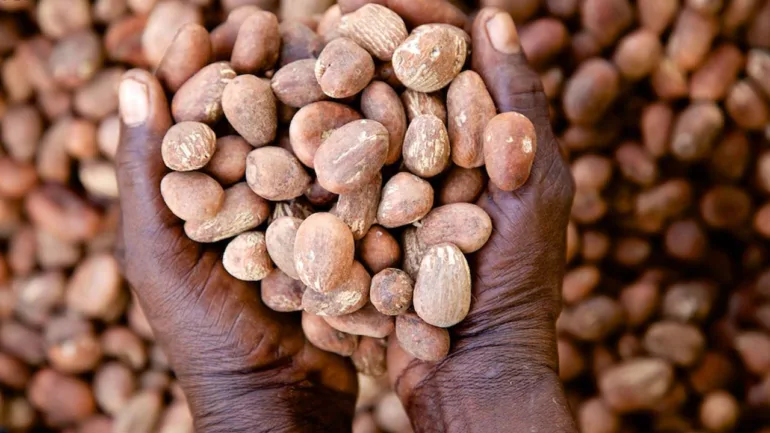President Bola Tinubu has approved an immediate six-month ban on the export of raw shea nuts. The goal is to curb informal trade, strengthen local processing, and unlock the economic potential of Nigeria’s shea industry, projected to generate over $300 million annually in the short term.
Announcing the directive at a multi-stakeholder meeting at the Presidential Villa, Vice President Kashim Shettima emphasized that the ban is not an “anti-trade” policy, but rather a “pro-value addition” strategy designed to ensure Nigerian processing facilities run at full capacity and deliver more jobs and income for rural communities.
“This move will shift Nigeria from being a raw shea nut exporter to becoming a global supplier of refined shea butter, oil, and other derivatives,” said Shettima. “It’s about industrialisation, rural transformation, women’s empowerment, and expanding our presence in global trade.”
Despite producing nearly 40% of the world’s shea nuts, Nigeria captures less than 1% of the $6.5 billion global market. The Vice President stressed that this is “unacceptable,” and projected a tenfold increase in revenue by 2027, if the value chain is fully developed.
The ban, a joint decision by federal and state stakeholders, is part of a broader plan to transform the agricultural sector. It will be reviewed after six months.
The Minister of Agriculture and Food Security, Senator Abubakar Kyari, highlighted the urgency behind the policy. “Nigeria produces about 350,000 metric tonnes of shea annually across 30 states, with the potential to grow to 900,000 metric tonnes. Yet over 90,000 metric tonnes are lost annually to informal cross-border trade.”
He explained that Nigeria’s installed processing capacity—160,000 metric tonnes—is currently underutilized, with factories operating at just 35–50% capacity. Meanwhile, regional competitors like Ghana, Burkina Faso, Mali, and Togo have already placed restrictions on raw exports to protect their own industries.
“We’ve been left as the regional hotspot for unregulated buying, and without decisive action, we risked becoming a dumping ground for raw shea exports,” Kyari said.
A recent Rapid Assessment of the Shea Value Chain, conducted by the Presidential Fertilizer and Shea Coordination Unit (PFSCU) in partnership with the Ministries of Trade and Agriculture, provided the data that shaped the president’s decision. The assessment engaged over 2,000 shea pickers and 65 processors nationwide.
With women making up 90% of shea pickers and processors, the ban is also a major step toward gender empowerment.
“By protecting the shea industry, we’re protecting the livelihoods, dignity, and opportunities of millions of Nigerian women,” said the Vice President. “We are not closing doors, we’re opening better ones.”
Minister Kyari reinforced this message, noting that shea is identified as a strategic non-oil export in Nigeria’s Zero Oil Plan. With the global market projected to grow from $6.5 billion to $9 billion by 2030, Nigeria is well-positioned to lead in both production and value-added exports.
“Few commodities offer Nigeria both a comparative and absolute advantage like shea. With over five million hectares of wild-growing shea trees, we have the natural and economic foundation to dominate the global value chain,” Kyari said.
The Vice President also revealed that Nigeria and Brazil are finalizing an agreement to prioritize access for Nigerian shea products in the Brazilian market, expected to be completed within the next three months.
“This temporary ban is just the beginning,” Shettima concluded. “We are laying the groundwork for an industry that will create jobs, generate revenue, empower women, and secure Nigeria’s place as a global shea powerhouse.”


